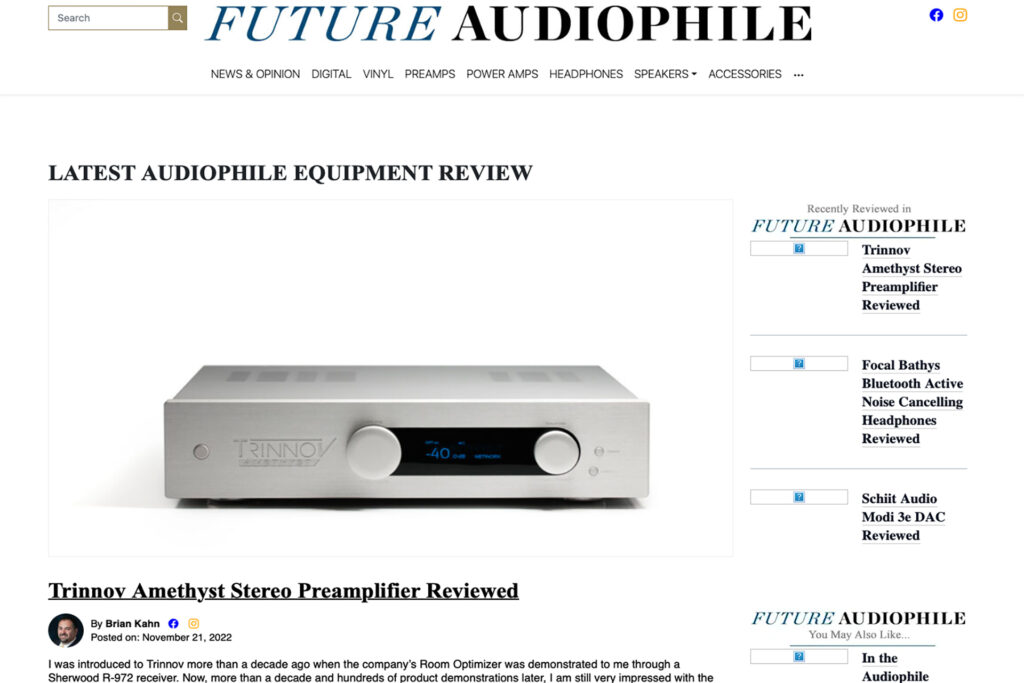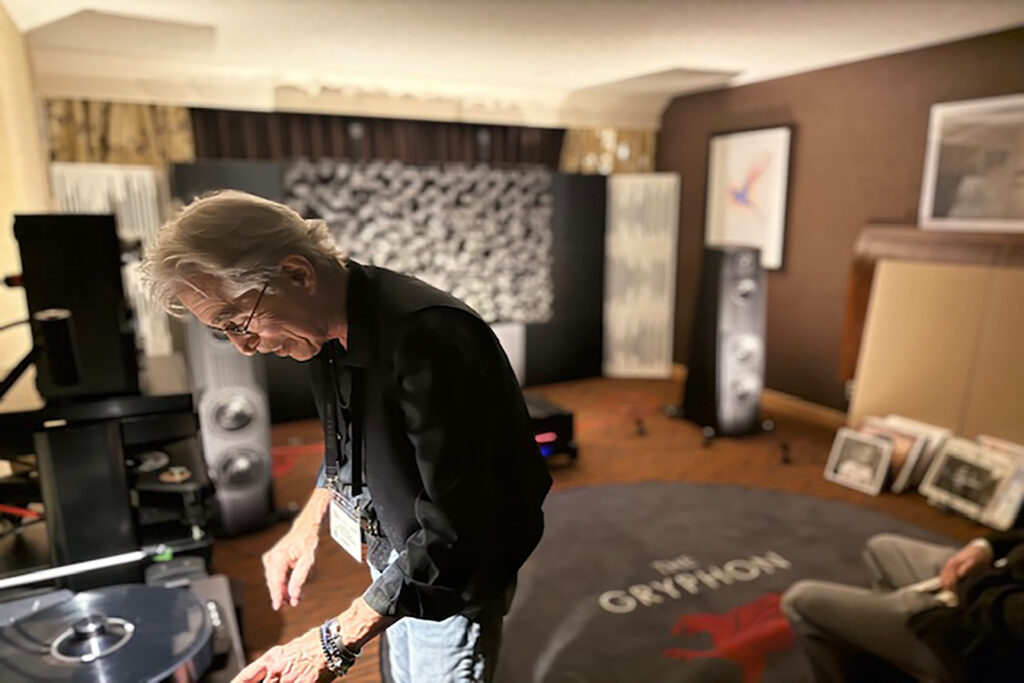FutureAudiophile.com is the fastest-growing audiophile publications in any media as of 2025. Founded as the cornerstone of their third group of consumer electronics publications under the umbrella of Santa Monica, California-based Luxury Publishing Group Inc., FutrueAudiophile.com is rooted in its CEO Jerry Del Colliano’s passion for high-end music playback and the audiophile hobby.
Without question, audiophilia is a niche hobby, but one that often delves into the cutting edge of technology with the hopes of giving audiophiles “the feels.” The goal of the hobby is, through the power of often simple and certainly time-tested technologies, to allow people to make the art of music an everyday part of life, be it sitting in a dedicated audiophile listening room or walking the streets of you-name-the-city listening to rocking tunes on some very cool wireless audiophile headphones.

The Founding of FutureAudiophile.com
The origin story of FutureAudiophile.com dates back to early 1996 and even before that. Del Colliano was a junior at the University of Southern California’s Thorton School of Music – Music Industry Program. Before Del Colliano became one of the first graduates of the leading program in 1997, he was already established as a young gun in the world of uber-high-end audio sales. As a teen growing up in Philadelphia, Del Colliano made a name for himself working in commission-only AV sales at Byrn Mawr Stereo in Abington, Pennsylvania. Bryn Mawr Stereo later would get acquired (and sadly ruined) by Tweeter (learn more here), a Boston-based regional AV retail chain that went public in that era. When Del Colliano got to California in the fall of 1993, he parlayed some of his early industry connections to get a sought-after sales position at the Beverly Hills-based audiophile salon, Christopher Hansen Ltd. While there, Del Colliano quickly became one of the top sales people in the world for Wilson Audio speakers, which at the time (as well as today) are some of the most expensive and well-respected audiophile speakers sold in the audiophile marketplace. Del Colliano’s early audiophile sales success led to him being recruited to work for Cello Music and Film Los Angeles, which was industry icon Mark Levinson’s (read about Mr. Levinson on Wikipedia) uber-high-end brand of audiophile electronics and speakers. Del Colliano thrived there as a college kid with a pager and a Rolodex of clients all over the Western half of the United States, as well as other countries ranging from Japan to Norway and beyond.
In 1996, when the commercial Internet was still in its embryonic stage, Del Colliano took a risk that specifically suited a college kid who had relatively low expenses. He left his solidly six-figure part-time college stereo salesman job to follow in the family business of publishing. Like his father at Inside Radio (then a leading terrestrial radio industry publication delivered by fax), the younger Del Colliano looked to new media in his early days in Hollywood. The Internet in the mid-1990s was the perfect place for such risk-taking, as industry leaders and establishment media like Stereophile and The Absolute Sound catered to Baby Boomer readers and were very much married to old-school publishing, such as print magazines.
With an $11,000 (partial) commission from selling a $350,000 Cello Music and Film system to a professional poker player, Howard Lederer, in Las Vegas, Del Colliano had a little bit of seed money to try something most people, at the time, considered batshit crazy. On April 1, 1996, Del Colliano left his lucrative and road-more-traveled career path in high-end audio sales and focused on bringing that topic to an online audiophile magazine to be published on the Internet. AudioRevolution.com was founded. Powered by an Apple MacBook 520B with its black-and-white monitor and 9600-baud dial-up modem, Del Colliano was off to the races.
11 years into the project, AVRev.com (Del Colliano was able to shorten the URL a few years into AudioRevolution.com) was sold on February 29, 2008 to El Segundo, California-based Internet Brands. Sadly, the AVRev.com team was decimated by its new Wall Street-backed owners. However, without any kind of a non-compete in place, Del Colliano was able to make like The Blues Brothers, thus putting the band back together again. Within months, HomeTheaterReview.com was born, with AudiophileReview.com to follow in the years after. HomeTheaterReview.com became the leading publication in its niche-enthusiast topic within about five years, having won significant market share from Sound + Vision, as well as Home Theater Magazines. About 10 years later, Del Colliano would sell HomeTheaterReview.com and AudiophileReview.com to JRW Publications in another seven-figure acquisition. This was 100 days before the COVID-19 pandemic.
Del Colliano tried some other publication concepts during the pandemic (while honoring his three-year non-compete agreement with JRW Publishing), including an ill-fated attempt at a paywall-based tip sheet for DFS (Daily Fantasy Sports) betting aka: FantasyDFSExperts.com. Towards the end of his three years away from the business and the expensive failure in the DFS sports space, Del Colliano had the itch to get back into the consumer electronics publishing space – specifically the audiophile world. This gave birth to a new publication called FutureAudiophile.com.
What is the Mission of FutureAudiophile.com?
Almost all of those involved in the audiophile hobby are men: Baby Boomer men, not younger people. Millennials and eventually Generation Z had grown up in a world with concepts like portable audio and unlimited access to vast catalogs of music, and they were often too young or too put off by the somewhat snobby and aloof attitudes of many in the audiophile hobby. Before the natural actuarial end of the core demographic of the audiophile hobby is upon us, something has to be done to appeal to a younger generation of audiophiles. Younger people today love music. Younger people today also love new technology. At the same time, kids today also think vintage audio such as vinyl and turntables are cool again. In consulting with his team of his most trusted advisors, such as Sandy Gross (the co-founder of Polk Audio, Definitive Technology and GoldenEar speakers) and Mark Ormiston (the most significant and respected specialty retailer in the AV space, who owned Definitive Audio for 25 years before selling the firm), as well as Marc Finer (an industry consultant who is best known for helping Sony launch the Compact Disc in 1983), Del Colliano honed in his strategy for FutureAudiophile.com.
The mission statement for FutureAudiophile.com is clear and publicly declared. The idea that the audiophile hobby should be a “sit in a dark and messy room while listening to uber-expensive, ultra-exotic equipment alone” has come to the end of its run. Inclusion of younger and more diverse people to the hobby is badly needed. New voices for equipment reviews were seriously lacking in the hobby. There were audiences out there to be gained, but nobody was making a move. In November of 2022, FutureAudiophile.com was launched.

A New Voice for Audiophile Publishing Online Was Born at FutureAudiophile.com
Nearly all of the people who wrote about audio in 2022 were older men. They represented the then-narrowly focused demographic of the industry, but in no way represented the future. Del Colliano saw that opportunity and started building his editorial team with one concept in mind: finding the best reviewing talent who represented all of the hobby – not just the voices of the past.
Generation X writers were the next, most likely buyers for high-end audio systems, as Del Colliano added a handful of voices his age to the team. Brian Kahn goes back 20-plus years with Del Colliano’s publications and was one of the first to join the staff. Other HomeTheaterReview.com and AudiophileReview.com staffers came on board for Del Colliano’s new venture. Jim Swantko had established his very high-end audio system as a tour de force in his native North Carolina. Paul Wilson was the editor of AudiophileReview.com, but left a year or so after the publication was sold. Wilson was one of the first early hires at FutureAudiophile.com. Greg Handy is a Generation X music streamer and digital audio specialist who wrote for past publications and also was part of the opening editorial lineup.
Younger voices were added to the staff as well. Eric Forst and Andrew Dewhirst are two Millennial writers who have extensive professional backgrounds in emerging technology and health. Forst has a Master’s Degree in audiology and is a fantastic photographer. Nasim Abu-Dagga is a Generation Z audiophile voice unlike any other in the space today. With a degree in engineering from Iowa, Abu-Dagga , in his early 20s, races Porsches and works in aerospace. His love for audio is representative of a whole new outlook on the hobby. Forst’s focus on matters of health and hearing bring a unique perspective.
Current Absolute Sound writer (formerly with Stereophile) Steven Stone was an early and significant contributor to FutureAudiophile.com. His focus on Chi-Fi (very affordable Chinese-made high-end gear) brought a different type of unique voice to FutureAudiophile.com, as the establishment print magazines were very much focusing on what beyond-expensive gear that they could sell to their aging readership. Stone, as a writer and photographer with over 40 years professional experience, was talking about $99 Fosi BT20A Integrated Amps and very good $300-per-pair bookshelf speakers. It was refreshing and the readers took note.
Other, more established writers helped to round out the early FutureAudiophile.com staff. Mike Prager is the former president of The Pacific Northwest Audiophile Society. He has a Ph.D. and a degree from M.I.T., and is retired from his professional work as a scientist. He mentors younger audiophiles in Oregon to this day and is a welcome voice on the FutureAudiophile.com team, especially with his expertise in audiophile subwoofers and digital room correction. John Marks was a long-time contributor to Stereophile Magazine, as well as a classical music recording engineer. His early contributions to the publication led to FutureAudiophile.com being a leader in the new trend of Class-D “switching” audiophile amplifiers.
The search for exciting, new and insightful voices to write for FutureAudiophile.com is ongoing.

Why Can You Trust FutureAudiophile.com?
Our history dates back to the primordial ooze of the Internet in the early 1990s. We were talking about audiophile topics online when modems made ugly noises and Google wasn’t a thing yet.
FutureAudiophile.com content is not “pay to play,” as some other publications are. We review products from our advertisers (learn more about our ad standards here). We review more from companies who do not spend with us (and likely never will). We don’t care, because we don’t play favorites. What we do is to curate our review content to offer our readers the best possible gear for them to explore – always for free. Our editorial model highlights the upsides as well as the downsides of the products in an easy-to-read format. We help our readers understand who a review product is best suited for. We use video examples to highlight our musical examples. We expend tremendous effort to compare a review product to the best possible and most comparable products.
A little-known fact is that we won’t do business with or review products from companies that we know are unethical or sketchy. There are plenty of such companies in the specialty audiophile world, sadly. We track them and even have a “banned list” in our CRM. Let’s put it this way – if an audiophile company acts poorly towards a member of the media, they will feel just as comfortable exhibiting the same abhorrent behavior to our readers. That’s why we don’t review gear from certain unsavory audiophile companies.
Don’t worry, no audiophile publication does more volume of audiophile equipment reviews. Not in print. Not online. Not on YouTube.com. FutureAudiophile.com creates more volume of professional, high-ethics fact-based audiophile equipment news than any other publication on the planet Earth right now.

FutureAudiophile.com’s Commitment to Its Readers …
FutureAudiophile.com is a non-paywall, free-to-read audiophile magazine, written for the audiophile enthusiast who is tired of voodoo and bullshit. He or she is looking for value as well as performance in every upgrade that they make. FutureAudiophile.com’s content is designed to be an audiophile conversation starter more than a guilt trip designed to sell another five-figure component. FutureAudiophile.com’s content is purposefully designed to get audiophiles thinking about how music, audio and technology can make their lives better, more heathy, less anxious and happier.
Future Audiophile doesn’t fall victim to audiophile voodoo, snobbery or anti-science hyperbole.
FutureAudioohile.com calls the shots as we see them, and we are not afraid to break a few eggs to make an omelet. You can see that in the moderated comments on the review and news pages of the site. Our editorial voice is conversational, accessible and fun. We do talk politics. We also talk religion, and we make no excuses for not creating kiss-ass milquetoast content that is provided by many of our competitors. Like the weather in Maui, if you don’t like it now – give it 15 minutes and it will be something different. Our readers know this as we take on difficult and meaningful consumer electronics, audio, music and technological topics that are often controversial. While nobody agrees with our content all of the time, all of our readers know that we have their best interests in mind.

We’ve polled over 1,000 Millennial audiophiles for what they want most from the hobby. Their answer is clear, dominant and almost without exception … they demand value from any and every audiophile component that they prompts them to make an investment. The idea of $20,000 components is fine, just as Road + Track will put a $300,000 Ferrari on the cover of their print magazines. The reality is that many more people actually buy a new Subaru WRX or Volkswagen GTI than they do a new Ferrari. FurtureAudiophile.com is proud to be able to deliver content covering every element of value in the pantheon of audiophile gear.
While our editorial mission will evolve over time, our commitment to our readers will never waver.
FutureAudiophile.com is dedicated to creating the most insightful, easy-to-read, easy-to-understand, real-world, no-voodoo, no-bullshit content in the audiophile world.
Just as we encourage you to enjoy every step of your audiophile journey with our hobby – we are continuing to refine and evolve our editorial mission.
To be clear, it is anything but easy to find new audiophiles and engage them in our hobby, but we are more dedicated than ever to rising to the challenge.
We hope you enjoy FutureAudiophile.com now and for years to come.


